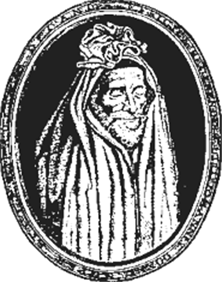Major poets of the period
Shakespeare was an omnivorous reader, and must have been keenly interested in the poetry of his time --he contributed sonnets and two narrative poems himself as well as the powerful poetry of his plays*. But it is difficult to say how much influence other poets had on his language.
These links offer brief notes on some major poets of Shakespeare's time:
- Edmund Spenser (c. 1552-1599)
- Sir Philip Sidney (1554-1586)*
- John Donne (1572-1631)*
- Ben Jonson (1572-1637)*
. . . Frenzied poets?
Listen to the passage.
The poet's eye, in a fine frenzy rolling,
Doth glance from heaven to earth, from earth to heaven;
And as imagination bodies forth
The forms of things unknown, the poet's pen
Turns them to shapes, and gives to airy nothing
A local habitation and a name
(A Midsummer Night's Dream, 5.1.7-17; audio portion read in Shakespeare's original pronunciation.)
Footnotes
-
Poetry changes
One of the most striking things that happens to poetry in the period of Shakespeare's output is the way it becomes dramatic, particularly in the sense that poems by a single author are written with different voices: thus John Donne can seem at one moment a sincere lover, the next a profligate, the next a deeply religious ascetic--and the same variety can be found in the poetry of Ben Jonson, and of those who followed these two influential figures.
-
Sir Phillip Sidney (1554-1586)
 Sidney
SidneySidney, discussed elsewhere for his important critical work (the Defense of Poetry), his Sonnets, and his prose romance (the Arcadia), was a popular and romantic figure of the time, fitting in the public imagination the image of the ideal courtier, courtly lover, and chivalrous knight. He knew Spenser well, and praised his poetry in the Defense (though like Ben Jonson, he thought the use of archaisms unpoetic). Shakespeare used Sidney's Arcadia as a source, most notably for the sub-plot of King Lear.
Sidney's sister, Mary, Countess of Pembroke, became the centre of an influential literary circle; she edited and published both the Arcadia and the sonnet cycle Astrophel and Stella.
Sidney's death was as chivalric as his life, at least according to his first biographer, Fulke Greville:
[Seriously wounded, and] passing by the rest of the army, . . . he called for drink, which was presently brought him, but as he was putting the bottle to his mouth, he saw a poor soldier who had eaten his last at the same feast, ghastly casting up his eyes at the bottle. Which Sir Philip perceiving, [he] delivered it to the poor man with these words, "Thy necessity is yet greater than mine."
-
John Donne (1572-1631)
Donne's poems were not published until 1633, well after Shakespeare's death, and it is not likely that Shakespeare would have read them, although his verse circulated widely in manuscript. But (like Ben Jonson) Donne was only eight years younger than Shakespeare. His "metaphysical" style, with its concentration of meaning and abrupt shifts of direction and mood, is not one that is likely to work well on stage, where the actor must communicate without the benefit of re-reading, or skipping back a few lines.
It is nonetheless true that in some of Shakespeare's later plays the language becomes almost Donne-like, especially when the speaker is under extreme stress--Lear's madness, or the obsessive jealousy of Leontes in The Winter's Tale, for example.
Donne's prose in his published sermons and meditations at times becomes as powerful in rhythm and metaphor as his poetry.
-
Ben Jonson (1572-1637)
Jonson's plays and criticism are discussed extensively elsewhere in these pages. His poetry, like all his work, is notable for its adherence to classical rules of decorum. Jonson makes a fascinating contrast to Donne (who, he claimed, would "perish for want of being understood"; where Donne is ingenious, passionate, convoluted, Jonson's poetry is clear, restrained, and direct. An illustration of the difference is that the modern student needs far fewer footnotes to understand Jonson.
Though simpler, Jonson's poetry is no less powerful or varied. His lyrics and elegies are most often anthologized, but he wrote satires, burlesques, epigrams, and religious poems as well. One of the many poems that defies categorization is "Inviting a Friend to Dinner," which gives an informal and charming glimpse of an Elizabethan domestic evening.
Jonson's influence was such that a whole group of poets became known as "the Tribe of Ben"; in his attitudes and style he anticipated, and paved the way for, the neo-classical poetry of the Restoration.
